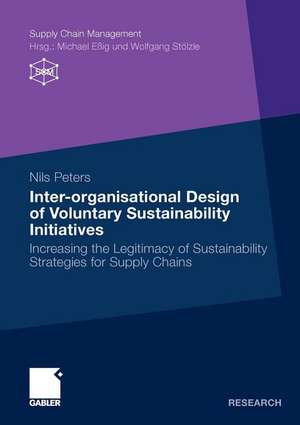Inter-organisational Design of Voluntary Sustainability Initiatives: Increasing the Legitimacy of Sustainability Strategies for Supply Chains: Supply Chain Management
Autor Nils Peters Cuvânt înainte de Prof. Dr. Wolfgang Stölzleen Limba Engleză Paperback – 24 feb 2010
Din seria Supply Chain Management
-
 Preț: 456.66 lei
Preț: 456.66 lei - 15%
 Preț: 532.23 lei
Preț: 532.23 lei - 15%
 Preț: 443.13 lei
Preț: 443.13 lei -
 Preț: 485.46 lei
Preț: 485.46 lei -
 Preț: 375.06 lei
Preț: 375.06 lei -
 Preț: 379.48 lei
Preț: 379.48 lei -
 Preț: 484.47 lei
Preț: 484.47 lei - 15%
 Preț: 444.94 lei
Preț: 444.94 lei - 15%
 Preț: 440.54 lei
Preț: 440.54 lei - 15%
 Preț: 444.79 lei
Preț: 444.79 lei -
 Preț: 384.31 lei
Preț: 384.31 lei -
 Preț: 488.92 lei
Preț: 488.92 lei -
 Preț: 493.73 lei
Preț: 493.73 lei -
 Preț: 352.63 lei
Preț: 352.63 lei -
 Preț: 422.70 lei
Preț: 422.70 lei -
 Preț: 492.96 lei
Preț: 492.96 lei - 15%
 Preț: 588.37 lei
Preț: 588.37 lei -
 Preț: 391.79 lei
Preț: 391.79 lei - 15%
 Preț: 553.98 lei
Preț: 553.98 lei - 15%
 Preț: 499.26 lei
Preț: 499.26 lei -
 Preț: 492.96 lei
Preț: 492.96 lei - 15%
 Preț: 470.38 lei
Preț: 470.38 lei - 15%
 Preț: 636.80 lei
Preț: 636.80 lei - 15%
 Preț: 474.63 lei
Preț: 474.63 lei - 15%
 Preț: 597.01 lei
Preț: 597.01 lei - 15%
 Preț: 579.34 lei
Preț: 579.34 lei - 21%
 Preț: 356.85 lei
Preț: 356.85 lei -
 Preț: 202.45 lei
Preț: 202.45 lei -
 Preț: 173.74 lei
Preț: 173.74 lei -
 Preț: 173.84 lei
Preț: 173.84 lei -
 Preț: 260.64 lei
Preț: 260.64 lei
Preț: 383.33 lei
Nou
Puncte Express: 575
Preț estimativ în valută:
73.35€ • 76.58$ • 60.71£
73.35€ • 76.58$ • 60.71£
Carte tipărită la comandă
Livrare economică 04-18 aprilie
Preluare comenzi: 021 569.72.76
Specificații
ISBN-13: 9783834921512
ISBN-10: 3834921513
Pagini: 252
Ilustrații: XXIII, 226 p. 23 illus.
Dimensiuni: 148 x 210 x 24 mm
Greutate: 0.3 kg
Ediția:2010
Editura: Gabler Verlag
Colecția Gabler Verlag
Seria Supply Chain Management
Locul publicării:Wiesbaden, Germany
ISBN-10: 3834921513
Pagini: 252
Ilustrații: XXIII, 226 p. 23 illus.
Dimensiuni: 148 x 210 x 24 mm
Greutate: 0.3 kg
Ediția:2010
Editura: Gabler Verlag
Colecția Gabler Verlag
Seria Supply Chain Management
Locul publicării:Wiesbaden, Germany
Public țintă
ResearchCuprins
Conceptual aspects of voluntary sustainability initiatives in the context of proactive sustainability strategies for supply chains.- Theoretical aspects of designing voluntary sustainability initiatives for supply chains.- Initial framework: a resource-based view of institutional entrepreneurship in the design of voluntary sustainability initiatives for supply chains.- An exploratory study of the institutional entrepreneur's resources in the design of legitimised voluntary sustainability initiatives for supply chains.- Development of the research model: resources, the design of voluntary sustainability initiatives for supply chains, and legitimacy.- A confirmatory study of the institutional entrepreneur's resources in the design of legitimised voluntary sustainability initiatives for supply chains.- Conclusion, further research and implications for business practice.
Notă biografică
Dr. Nils Peters received a doctor’s degree from the University of St.Gallen (HSG) in business administration at the chair of Prof. Dr. Wolfgang Stölzle. Since then he works as management consultant.
Textul de pe ultima copertă
Voluntary sustainability initiatives (VSIs) have become the most applied approach for companies to set environmental or social obligations for their supply-chains. However, companies face two main challenges in the design of VSIs: Firstly, they recognise acceptance problems by different stakeholders and opposition by competing initiatives. Secondly, they experience significant resource demands to set up VSIs and ask for more efficient solutions. Nils Peters addresses these challenges by empirically analysing the key resources and complementarities that enable companies to efficiently establish effective designs of VSIs both in terms of participants’ compliance and the acceptance of initiative-external stakeholders.












